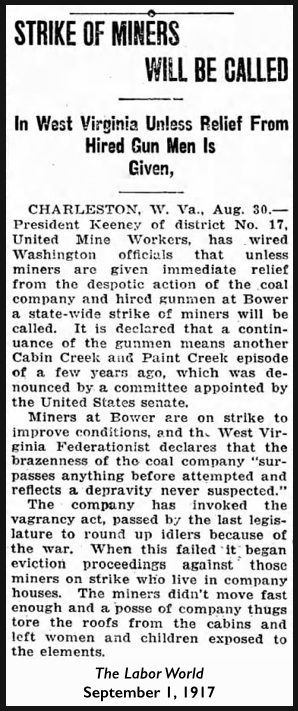There are no limits to which
powers of privilege will not go
to keep the workers in slavery.
-Mother Jones
Hellraisers Journal, Saturday February 2, 1918
State of West Virginia – Targets Strikers with Vagrancy Law
From the Duluth Labor World of January 26, 1918:
STRIKERS ARE TERMED LOAFERS
—–
West Virginia Law Makes Idle Men Subject
to Arrest for Vagrancy.
—–
WHEELING, W. Va., Jan 24-Men who go on strike in West Virginia are liable to arrest for vagrancy under the new vagrancy law rushed through the last special session of the legislature. The law provides, under penalty of arrest and sentence for vagrancy, that able-bodied men, between the ages of 16 and 60, must be employed in some lawful, useful and recognized business or occupation whereby they may earn a sufficient income to support themselves and those legally dependent upon them.
A number of strikers already have been arrested under new law. The restlessness of organized labor in West Virginia is conceded to be the impelling force that necessitated an extraordinary session of the legislature to pass this law.
[Says a West Virginia labor official:]
Under the guise of attacking the loafer, the state legislature created the most effective instrument for the breaking of strikes.
The sinister aspect of the law is to be seen in the fact that no penalty is provided for the man who withholds work from others eager for the opportunity to earn. Lockouts are legal, while strikes are criminal.
Also from The Labor World:
COST OF LIVING NEARLY DOUBLED
SINCE WAR BEGAN
—–
Increase of 88 1-2 Per Cent, According
to Federal Investigators.
—–PHILADELPHIA, Jan. 24 —To live as comfortably now as in 1914, working people in this city and vicinity are obliged to spend for bare necessities alone, 88½ per cent more than was needed before the war, according to statistics by investigators for the federal department of labor. These figures were explained by John M. Foster of the department of labor, at a hearing of the wage commission of the federal shipping board, which is attempting to establish a standard wage scale for ship yard employes along the Delaware river.
Trade unionists insisted that the advances in necessities since 1914 is more than 88½ per cent. Some of them placed emphasis on the point that while the government’s percentage may be accurate no attention had been given the quality of the staples received for the money paid out. Hundreds of families depending on a husbands or a son’s income, they said, have not seen a steak or a roast of beef since the war began. It was maintained also that they were wearing clothing of an inferior grade and one or two pairs of shoes a year instead of three or four for each member of the household.
Edward L. Keenan, president of the central labor union, said that a family of five cannot possibly live on $4.50 a day, with prices as they are now. He quoted prices of eggs, meats, flour, fuel and other necessities, to show that $4.50 once a respectable wage, was now a mere pittance.
———-
SOURCE
The Labor World
(Duluth, Minnesota)
-Jan 26, 1918
https://chroniclingamerica.loc.gov/lccn/sn78000395/1918-01-26/ed-1/seq-1/
IMAGE
WV Miners Strike, Gunthugs, Labor World, Sept 1, 1917
https://chroniclingamerica.loc.gov/lccn/sn78000395/1917-09-01/ed-1/seq-13/
See also:
West Virginia Idleness and Vagrancy Law
-passed May 19, 1917, effective June 19, 1917
https://archive.org/stream/jstor-1133743/1133743#page/n1/mode/2up
WE NEVER FORGET: Thomas Baldwin
Union Coal Miner, Murdered at Raleigh, West Virginia, November 13, 1917

